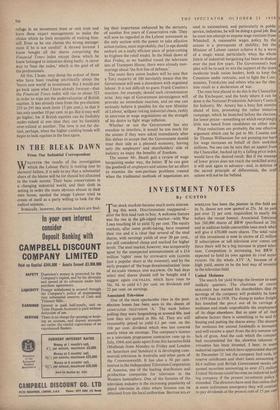IN THE BLEAK DAWN
From Our Industrial Correspondent
WHATEVER the results of the investigation which the Labour Party is making into its electoral failure, it is safe to say that a substantial share of the blame will be (or should be) allocated to the trade unions. Their basic conservatism in a changing industrial world, and their sloth in setting in order the more obvious abuses in their own house, spoiled the image Labour tried to create of itself as a party willing to look for the radical solution.
Ironically, however, the union leaders are find-
ing their importance enhanced by the certainty of another five years, of Conservative rule. They will now be regarded in the Labour movement as the only section with the power to take effective action (unless, most improbably, the Co-ops should embark on a really efficient piece of price-cutting to frighten the retail trade). In the bleak dawn of that Friday, as we huddled round the television sets of Transport House, there were already mur- murings about 'the first line of defence.'
The more fiery union leaders will be sure that a Tory majority of 100 inevitably means that the Government will seek a showdown with organised labour. It is not difficult to guess Frank Cousins's reaction, for example, should such circumstances arise. Any sign of Government intransigence will provoke an immediate reaction, and no one can seriously believe it possible for the new Minister of Labour, without risking industrial chaos, rashly to intervene in wage negotiations on the strength of his desire to fight wage inflation.
Whether or not the Government has any mandate to interfere, it would be too much for the unions if they were asked immediately after this defeat to accept that the Government should treat their side as a planned economy, leaving only the employers' and shareholders' side of industry to enjoy the benefits of freedom.
The sooner Mr. Heath gets a review of wage bargaining under way, the better. If he can gain the goodwill of employers and unions for an effort to examine the non-partisan problems created when the traditional methods of negotiation are
used in nationalised, and particularly in public service, industries, he will be doing a good job. But he must not attempt to impose wage restraint from Whitehall. A reasonable wages policy by the unions is a prerequisite of stability; but the Minister of Labour cannot achieve it by a wave of a magic wand, particularly when the whole fabric of industrial bargaining has been so shaken over the past few years. The Government's best plan will be to seek to win the support of the more moderate trade union leaders, both to keep the Cousinses under restraint, and to fight the Com- munists, Trotskyists and others who see the elec- tion result as a declaration of war.
The man best placed to do this is the Chancellor of the Exchequer, and the body where it can be done is the National Production Advisory Council for Industry. Mr. Amory has a busy few months ahead of him, promoting the rather tentative campaign, which he launched before the election, for lower prices—something on which surprisingly little was heard from candidates on either side
Price reductions are probably the one effectiv argument which can be put to Mr. Cousins an' Sir Thomas Williamson for not pressing too har for wage increases on behalf of their unskille millions. No one can be sure that an appeal fron the Chancellor, backed up by a falling price index would have the desired result. But if the messag' of lower prices does not reach the unskilled army it will seek again to advance—and, in defence the sacred principle of differentials, the craf unions will not be far behind.






































 Previous page
Previous page